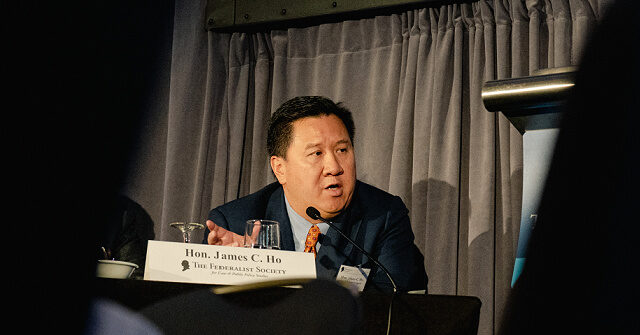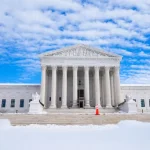

WASHINGTON, DC — Public leaders like federal judges need to embrace that pressure is a privilege and get comfortable with it, Judge Jim Ho of the U.S. Court of Appeals for the Fifth Circuit told an audience at the Heritage Foundation when delivering its prestigious Joseph Story Lecture on Wednesday.
Ho was introduced by John Malcolm, vice president of Heritage’s Institute for Constitutional Government and director of its Meese Center. Noting that Ho once served as a law clerk to Justice Clarence Thomas, Malcolm said many in the room would love to see Judge Ho one day join the Supreme Court as Justice Ho, alongside Justice Thomas.
“I wasn’t born in the United States. I didn’t enter this world as an American. But I wake up every morning thanking God that I will leave this world as an American,” Ho began. “I like to say that I’m Taiwanese by birth, Texan by marriage. But most importantly, I’m American by choice.”
A prominent conservative federal appeals judge in America, Ho made the case that certain constitutional principles are foundational to American exceptionalism and that two of those principles are federalism (keeping federal and state governments in their respective spheres) and revering free speech, especially from people with whom we disagree.
“But we cannot lightly assume that these Founding values will always persist,” Ho cautioned. “They must be nurtured and taught. They must be passed down from generation to generation.”
Ho cited recent studies showing that “two-thirds of college students say it’s okay to shout down a speaker you oppose” and “41 percent of students now say that violence may be appropriate.”
“The typical justification you’ll hear for this discrimination is that some religious conservative views are just too much,” noting that much of the hostility is directed against people of faith and their social views. “They make people feel unsafe. So [some people say] it’s okay for us to eliminate these views from campus.”
Ho continued:
It’s the same pathos we see on college campuses: It’s not enough that I disagree with you—I also have to dislike you, and disparage and disrespect you as a human being. Instead of judging your reasoning, I pass judgment on the person behind it. I don’t presume good faith—I impute malicious intent.
But no matter how absurd or hateful the critics, I thank God that I live in a country, and under a Constitution, that guarantees everyone the right to criticize our officials.
That includes judges. In fact, if anyone in public office should be able to ignore criticisms and just do your job, it’s those who enjoy life tenure. Citizens have every right to expect federal judges to follow the law in every case, no matter how belligerent or baseless the booing of the crowd. Because that’s the job.
Ho went on to observe that criticizing judges in particular is nothing new. His advice: expect it, get used to it, and even get comfortable with it.
“We’re all extraordinarily blessed to live in this great country,” he observed as an immigrant. “And some of us are fortunate to play at least a small role in helping to lead this country forward – whether we’re judges or leading practitioners or influential legal scholars.”
An avid sports fan, the 50-year-old appellate judge noted that at the stadium where the final rounds of the U.S. Open are held, there is a sign with the words, “Pressure is a Privilege.” He says it is what a federal judge should remember every time they walk into a courtroom.
Ho explained:
As judges, we should always remember two things: That there are countless law students, lawyers, and fellow Americans who would do anything to trade places with us. And that no one forced you to become a judge. You agreed to become a judge. Some people even lobby and campaign for it. And you can quit anytime you want. It’s life tenure—not a life sentence. So you should only do it if you’re ready and willing to accept what it entails.
“It is my profound privilege to serve on the United States Court of Appeals for the Fifth Circuit,” Ho concluded.
Breitbart News senior legal contributor Ken Klukowski is a lawyer who served in the White House and Justice Department.






